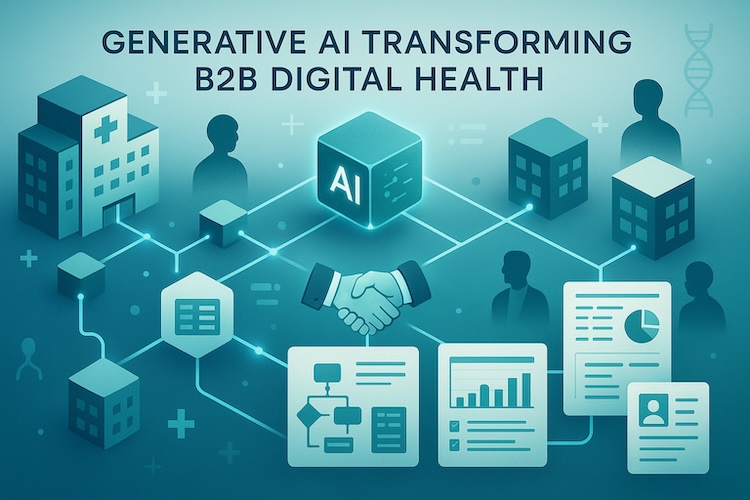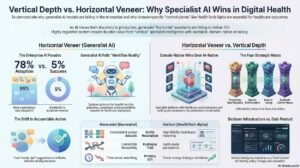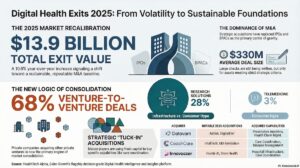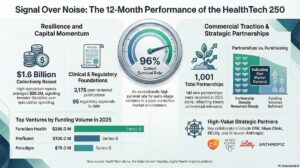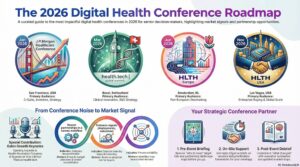TLDR
According to Galen Growth, at least 65% of global Digital Health companies operate with a B2B business model or a hybrid, making them directly exposed to the disruptive impact of generative AI. As highlighted in a recent McKinsey article (Unlocking Profitable B2B Growth through Gen AI), GenAI is transforming B2B sales by automating workflows, surfacing next-best opportunities, and enabling agentic AI that can act with limited human oversight.
This blog is not about how Digital Health ventures deploy GenAI in their products (e.g. clinical tools or patient-facing apps). It explores how startups must adapt their business processes — sales, fundraising, and partnerships — to thrive in a GenAI-driven B2B environment. For startups, investors, and corporates, this shift redefines how value is created, measured, and captured across the ecosystem.
A New Chapter for Digital Health
According to Galen Growth, at least 65% of global Digital Health companies operate with a B2B business model or a hybrid, making them directly exposed to the disruptive impact of generative AI on sales and customer engagement.
McKinsey’s article, Unlocking Profitable B2B Growth through Gen AI, highlights seven high-impact use cases that are already reshaping B2B engagement across industries. While their research spans multiple sectors, the implications are particularly acute for Digital Health, where long sales cycles, regulatory scrutiny, and evidence requirements make efficient go-to-market strategies critical.
Important distinction: This discussion is about GenAI as a business enabler, not as a product feature. The focus here is on how Digital Health ventures can use GenAI to transform their internal operations — from proposal writing and meeting prep to portfolio monitoring and partner engagement — rather than embedding GenAI into their clinical offerings.
The Opportunity – and the Risk
What this means for Digital Health startups
- Efficiency as table stakes
- Startups cannot afford the traditional inefficiencies of long proposal cycles, generic outreach, or under-researched meetings. GenAI-driven automation will compress timelines and reduce the cost of customer acquisition. Competitors who adopt early will set new standards of responsiveness.
- Data-driven credibility
- In healthcare, clinical evidence is non-negotiable. GenAI can help ventures synthesise trial data, generate regulatory-ready documents, and benchmark against competitors in real time. Crucially, this is about strengthening the sales and partnership process, not the product itself.
- Shift from selling to orchestrating
- With agentic AI capable of handling outreach, meeting prep, and follow-up, the role of the sales team will evolve from persuaders to orchestrators of intelligent workflows. This demands new skill sets, blending technical literacy with domain knowledge.
- Business models under pressure
- Subscription models, once attractive for predictable revenues, may need adaptation. If AI reduces procurement friction, corporates may expect more flexible, usage-based pricing. Startups must design models that balance accessibility with defensible margins.
- Winner-takes-most dynamics
- McKinsey highlights how AI advantages compound over time: better prioritisation leads to stronger pipelines, which create richer data for training, reinforcing the cycle. For Digital Health, this means first movers who master GenAI in business workflows may lock in significant market share.
How Startups Should Adapt Their Business Models
1. Re-architect the go-to-market with GenAI
Digital Health ventures must integrate GenAI into every step of their commercial process. This includes:
- Automating lead prioritisation based on payer, provider, and patient ecosystem data.
- Deploying AI-driven RFP response engines to increase win rates.
- Using meeting support tools to ensure every stakeholder interaction is informed and customised.
This is distinct from product innovation. It is about commercial excellence: reducing friction in B2B sales cycles and increasing credibility with partners.
2. Embed evidence generation into product DNA
Startups should design offerings where clinical and economic evidence is continuously generated, structured, and analysable by GenAI. This evidence should then feed directly into business processes such as sales proposals, investor decks, and partnership discussions — not just clinical validation.
3. Experiment with new commercial models
GenAI enables new forms of value exchange. For example:
- Risk-sharing contracts where AI predicts patient outcomes and revenue is linked to realised results.
- Pay-per-use models aligned to provider workflows rather than blanket subscriptions.
- Data-as-a-service add-ons where aggregated insights become a parallel revenue stream.
Again, these are business model innovations powered by AI, not product features.
4. Invest in explainability and trust
Healthcare stakeholders will not tolerate opaque AI. Startups must ensure that GenAI-driven insights used in sales and engagement are explainable, auditable, and compliant with regulatory frameworks. Trust, not speed alone, will define winners.
5. Upskill teams for the GenAI era
Sales, medical affairs, and product teams will need hybrid skill sets: part clinical strategist, part AI-native operator. This is about preparing staff to use AI in business processes effectively, not to code AI into the product.
Why It Matters for Investors
For venture capital and private equity firms investing in Digital Health, GenAI adoption in business operations directly impacts portfolio performance:
- Higher ROI on go-to-market – Automating sales cycles reduces burn and improves capital efficiency.
- Improved portfolio monitoring – GenAI can track ventures’ progress and risks across commercial milestones.
- Valuation resilience – Startups that embed GenAI into their workflows appear more scalable and resilient, improving investor confidence.
Why It Matters for Corporations Partnering with Startups
For pharmaceutical, medical device, and payer organisations, GenAI reshapes partnership expectations:
- Speed and agility – Corporations will favour startups with AI-assisted sales and response processes.
- Integration into enterprise workflows – Ventures must be able to plug into CRM, procurement, and analytics systems.
- Evidence-backed decision-making – Startups that use GenAI to synthesise evidence in proposals and negotiations reduce corporate risk.
How Galen Growth Can Help
At Galen Growth, we have built HealthTech Alpha, the leading intelligence platform for Digital Health, to help startups adapt their business processes to this new GenAI-driven reality.
- Market intelligence for action: Our proprietary taxonomy, signals (Evidence, Partnerships, Health Check), and Alpha Score equip startups with explainable, trusted data to differentiate themselves with investors and corporates.
- GenAI-powered Copilot: Startups can leverage Copilot to generate meeting prep packs, benchmark competitors, or build partnership dossiers in minutes – embedding GenAI into their workflows without the cost of building tools from scratch.
- Investor and corporate visibility: With over 50,000 ventures mapped, startups listed in HealthTech Alpha increase their discoverability to leading global investors and corporate partners seeking their “next-best opportunity”.
- Advisory and support: Beyond the platform, our advisory services guide startups in refining their business models, demonstrating evidence, and positioning for strategic partnerships or funding rounds.
By combining trusted data, GenAI capabilities, and strategic expertise, Galen Growth helps Digital Health startups not only adapt their business processes to the GenAI era but thrive in it.
Conclusion
The McKinsey framework highlights a fundamental truth: B2B sales are entering an era where GenAI and agentic AI define not just productivity but competitiveness. For Digital Health startups, this is both a challenge and an opportunity.
The challenge lies in adapting internal business processes — go-to-market, fundraising, and partnership execution — to embrace AI-native workflows while preserving the rigour of evidence and trust that healthcare demands. The opportunity is to leapfrog incumbents, compress sales cycles, and demonstrate capital efficiency – attributes that resonate with both investors and corporate partners.
In Digital Health, GenAI is often discussed in terms of product innovation. Yet its most immediate and transformative impact may lie in the business processes that underpin growth. Startups that act now, embedding GenAI into their commercial DNA, will not only survive but shape the next chapter of Digital Health. Those who hesitate risk being left behind in a market that is rapidly recalibrating its definition of readiness and value.
With Galen Growth and HealthTech Alpha as trusted partners, Digital Health startups have the tools, insights, and visibility to seize this moment and lead the future.


